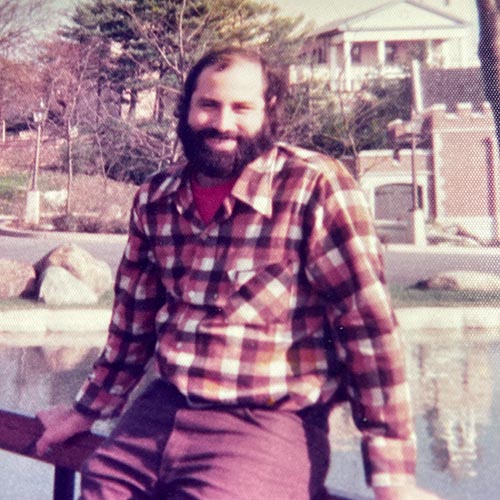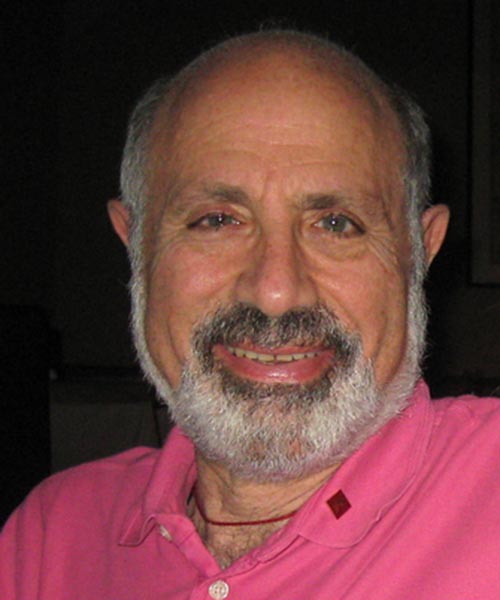Jeff Rubin ’71 felt like a fish out of water on South Mountain. He thought he wanted to be a veterinarian when he entered Lehigh in 1967 but quickly learned math and science were not his strong suit. While smart, he knew he just wasn’t going to study that hard unless motivated. While everyone else seemed to be walking around campus with a slide rule on their belt (especially with Lehigh athletic teams then known as the Engineers), he eventually found experimental psychology to be his natural bent.

It was perfect for his long-hair, grass-smoking, pseudo-hippie ways. He waltzed into Woodstock in ’69 and genuinely thought a long-lasting countercultural revolution was at hand. “I was part of the zeitgeist of the times,” he says. The motto of the class, “’71 for fun,” aptly reflected that spirit.
Rubin convinced a professor to offer him independent study credits so they could explore meditation together. By that point he was disappointed in Western approaches to psychology that primarily focused on the brain and pathology, and he began to read extensively on Far Eastern religions and disciplines that focused on the mind and innate human sanity and compassion. During his junior year, his draft lottery number fortunately came out high, so he avoided the military draft during the Vietnam War, staving off a difficult decision. He continued efforts to protest the war that was absolutely roiling the country.
Having become a bit too hippie-ish for his brothers in Sigma Alpha Mu during sophomore year, Rubin and two frat buddies rented an apartment in Catasauqua for his last two years at Lehigh. Almost dropping out after junior year, he thought better of it and returned to graduate.
After graduation, he traveled a bit and worked as a substitute teacher. His interest in Buddhism never waned. He met noted Tibetan master Chogyam Trungpa and studied with him and gained formal entry as a Buddhist.
Rubin tried being a postal worker but didn’t like it. When Bell Labs was looking for an employee with a psychology degree to work on the human side of larger computer systems, he applied and was hired. Soon he was applying his knowledge to improve computer-based technologies as computer usage in large business applications exploded. Initially this field was called human factors. Then usability. Then customer experience. Today, it’s known as user experience or UX.
For several years, Rubin worked at Bell Labs and then at a division of AT&T teaching the regional phone companies this evolving discipline. Eventually he formed his own consulting firm and wrote a book, still in use today, that became an industry bestseller and textbook at many colleges and universities.
During all of this, he married his high school sweetheart and raised three children.

Then in 2000, Rubin began developing a mysterious neurologically based illness, originally misdiagnosed as ALS. Over the years, he met with over 100 practitioners of all stripes from Western doctors to Eastern mystics. Eventually his illness was diagnosed as PLS, an incurable motor neuron disorder, similar to ALS but less devastating. Forcing him to go on disability, the illness radically altered his life.
Rather than battle it, he allowed it to lead him elsewhere. He soon was working on the Board of Trustees pro bono at Skylake Lodge, a meditation center in the Hudson Valley, New York, as it sat on the brink of economic closure. While there, he developed a signature program for the center, whose full title was: “Unconditional Healing: Embracing Illness and Adversity and Discovering One’s True Self.”
Unconditional Healing is a contemplative approach to working with life-altering adversity. Today, it’s a weekend program he offers on both coasts (pre-COVID-19 at least), and Rubin hosts educational support groups called Healing Circles that meet virtually twice monthly.
“Healing doesn’t have to mean fixing or curing alone,” he says. “Healing in its broadest context also includes our mental, emotional, and spiritual well-being. If we ignore those aspects in our life, especially while working with adverse circumstances, we miss an opportunity to go deeper. The key to unconditional healing is really self-acceptance and kindness to ourselves as we are.”
Rubin Defines Kindness and Suggest Four Ways to Apply It in Everyday Life
Kindness/Goodness
We are born with innate compassion and goodness. You can see it in a baby’s smile and hear it in her laugh. It is always there as a soft tender spot, a pilot light, if you will, that is never extinguished. But that light is often obscured by habitual patterns of self-absorption and fear. We protect our tenderness, our vulnerability, by wearing a psychological mask or covering it up completely. We build a cocoon around our true selves and become personas/caricatures of ourselves. Kindness helps us to accept who we are in this very moment. Practices like meditation allow us to feel what we feel, open our mind, and soften our heart. We can connect with that inherent compassion, let it expand, and share it with others. With that kindness visible, we can be seen by others as our authentic selves, maybe for the first time. But we have to work at this, and it requires courage to be vulnerable.
Here are some suggested ways to share kindness:
For Our Self
We are often obsessively concerned with getting ahead and becoming better versions of ourselves. Nothing wrong with that, of course, but such thinking often implies a lack of self-acceptance and even self-denigration. We can see that in the negative self-talk that makes us feel unworthy or not up to the challenge that our life presents (impostor syndrome). We can’t seem to accept where we are in our journey. We regret our past and worry about the future rather than being present and accepting who we are now. Meditation, a simple technique for following the breath as an anchor into the present moment, is ultimately a tool of self-kindness, allowing us to open up to our own warmth and genuineness.
For the Workplace
The workplace can be the hardest place for us to be our most compassionate and kindest self. We are often competing to stand out, to be more affluent and have more influence. That energy can lead to a cognitive dissonance with kindness and gentleness, making us two different people: one self at home and one at work. (Even remote work still involves interacting with work colleagues constantly.) Showing kindness at work begins with employing our discriminating awareness, a type of intelligence that sees the larger picture … when to offer a compliment or give credit to others and what behaviors to accept and reject in ourselves and others. Maybe we begin to realize that by looking out for others, rather than just ourselves, it’s a true win/win — it eventually circles back to us as well.
With Family
Ironically, it is often easier to express love and kindness to others than it is to our loved ones. With family comes baggage — they know us only too well, both when we’re at our best and at our worst. There is an expression that comes to mind from my teacher: “It’s relatively easy to become enlightened with everyone but your family.” At the same time, the challenge of always showing kindness to our loved ones, even the ones that push our buttons, paves the way for doing it with others as well. Maybe we have to work harder at it, but it does expose what aspects of our behavior we have to work on. If we can do it at home, practicing kindness with others becomes easier.
With Strangers
Maitri is a Sanskrit word that roughly means self-compassion and friendliness to others. Sadly, in our hyper-competitive and speedy society, maitri is often lacking, and we are hardest on ourselves. That’s where “random acts of kindness” comes into play. Because expressing kindness to others feels so inherently good, both conceptually and emotionally, it naturally reverberates back to us. It softens our hard edge. That internal feeling in turn radiates outward; it becomes tangible to others that we’re approachable and open. Ultimately, expressing kindness to others results in a virtuous circle of kindness. Our pilot light of compassion, which never goes out, engages and burns hotter and brighter. Opportunities to be kind in the face of suffering naturally find us.